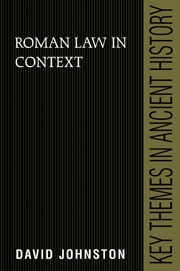2 - Sources and methodology
Published online by Cambridge University Press: 05 June 2012
Summary
Chapter I dealt with the main sources of Roman private law, in the sense of the formal sources which created it. This chapter is concerned with the use of Roman legal sources by the modern student or scholar. It gives an account of those sources and problems that arise in using them. Nearly all the surviving material of Roman law is transmitted in one or other of the emperor Justinian's compilations. The chapter begins with an account of the sources which survive independently of Justinian; it then moves on to the Digest and (very briefly) other parts of the Justinianic compilations. It concludes with a general discussion of the difficulties of trying to write history based on legal sources.
The emphasis throughout is on questions peculiar to the legal sources. No detail, for example, is given about problems relating to the transmission of texts, since this is not specifically a problem of the legal sources but one which affects all ancient literature.
SOURCES INDEPENDENT OF JUSTINIAN
Legal writings
The most important of the works which survive independently of the Justinianic compilations is the Institutes of Gaius, an elementary introduction to Roman law dating from about AD 160, and still the best introduction to the subject ever written. It contains a clear account of classical law and procedure, and also some valuable historical material of which the Digest preserves no record. It is preserved in a palimpsest discovered in Verona in 1816. It raises essentially the same textual critical problems as any other ancient work, and nothing in particular turns on the fact that it is a work about law.
- Type
- Chapter
- Information
- Roman Law in Context , pp. 12 - 29Publisher: Cambridge University PressPrint publication year: 1999

